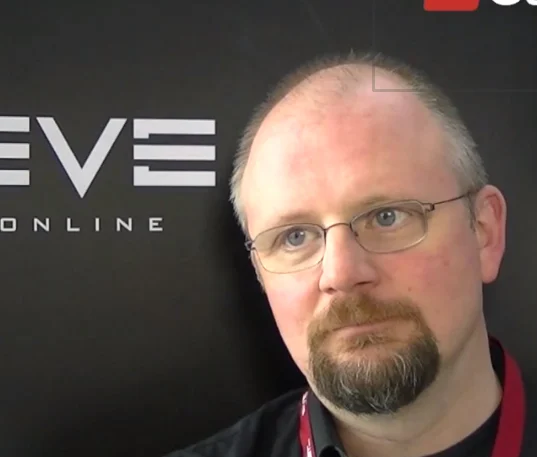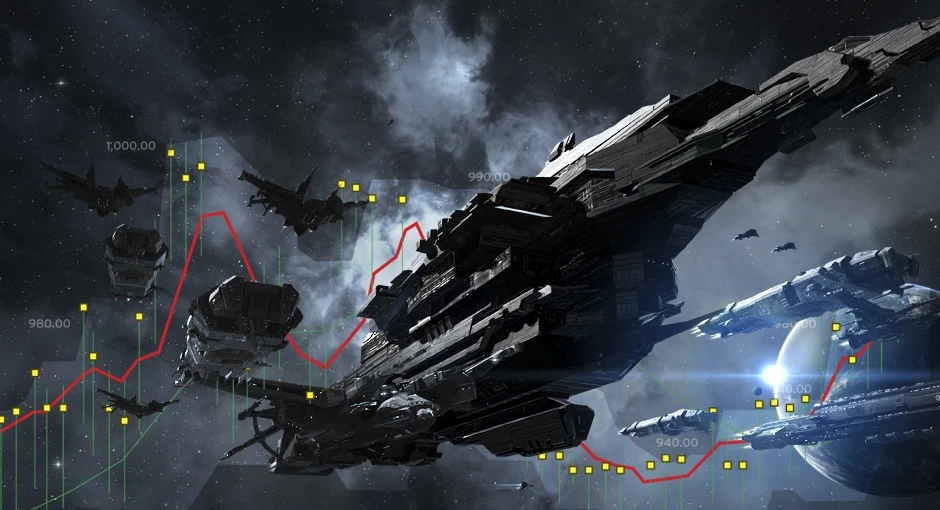Eyjolfur “Eyjo” Guðmundsson, an academic, a gaming buff, and an in-house economist for CCP Games, describes his job as being just like “a research scientist for a central bank.” Except his bank and its currency don’t exist in the real world.

Guðmundsson oversees the function of InterStellar Kredit (ISK), the in-game money for EVE Online, a science fiction-themed game world whose average player spends three hours a day online. Approximately 500,000 users worldwide use the platform to constantly plot, scheme, and attack each other in ways that would make the NSA and CIA proud. The game’s creators, Iceland-based CCP Games, built an online environment so complicated it requires a real-life security squad and even official, in-game economists–like Guðmundsson. They watch and learn tactics of the biggest rascals so they can take that knowledge into the broader virtual world. While the CIA was worrying about World of Warcraft being used for money laundering, EVE players were busy committing virtual currency fraud to defeat their online rivals.
Part of EVE‘s appeal is its immense complexity and offering a sandbox where players can behave completely awfully to other players. While Warcraft and other massive multiplayer games such as Starcraft II are designed to be intuitive and draw a player into a world whose complexity and subtlety matches the time investments they put into a game, EVE throws players into the deep end of the pool. CCP representatives told me a significant percentage of the game’s players work in IT, and it shows: The company makes a game API available for developers to build on, and EVE‘s player base has largely moved beyond traditional mods to make amazingly complicated add-on tools.
The world CCP presides over would seem daunting to outsiders. Alongside the core product of EVE Online, there is also a shooter game called named Dust 514 whose players’ actions affect EVE‘s in-game economy, and a separate game server named Serenity aimed at CCP’s large Chinese market. Players in EVE are divided up into guilds called “Corporations,” which are free to fight and scam each other in endless libertarian abandon. In the gaming community, EVE‘s players have become famous for elaborate virtual Ponzi schemes, like one 2011 scam which fleeced approximately 8,000 players of their in-game earnings, and for elaborate intelligence schemes where spies infiltrate rival corporations for secrets.
The In-Game Economy
The economy that supports EVE is all founded on in-game currency InterStellar Kredit (ISK) and currency-like Pilot License Extensions (PLEXes); PLEXes can be purchased through real-life currency as well. That’s where the economist Guðmundsson comes in. Alongside standard research scientist fare such as writing internal reports, he has to occasionally intervene to prevent inflation and unintended market consequences. Because PLEXes are tangentially related to the actual, real-life global economy, he helps CCP build protocols for when real life intrudes into the virtual game economy.
Guðmundsson explained how his work as a traditional economist translates to the gaming world, especially in terms of PLEXes. While CCP tries to keep as hands-off as possible in terms of PLEXes, they are obtained through electronic time codes which can be purchased from Amazon, Steam, and a variety of smaller retailers that accept any real-life currency imaginable. Because the electronic time codes are purchased with actual currency, he has to occasionally use the same kind of measures central bankers use to keep things going. If a bubble forms due to broken code or game mechanics abuse, Guðmundsson and CCP will intervene; the company will sell PLEXes in-game, for in-game currency, from their own reserve stock to stabilize prices, but “only if we know the reasons and the results of our actions,” as Guðmundsson puts it. Then there are the ISKs. Guðmundsson adds:
EVE, as a platform, is an economic sandbox. When I joined the company, CCP wanted an economist because of the sheer complexity of the market in a player-driven system. Once the game had over 100,000 participants, it was hard to understand exactly what’s going on. Our in-game economic system is very lassiez faire and we don’t intervene in player actions unless it’s due to a broken system. Players can behave however they want in the in-game world, but we intervene over things like producing something out of nothing because the [backend] code is broken.
Because of EVE‘s hyper-libertarian online economy, things actually happen that would give real-world central bankers nightmares … or cause massive lawsuits. Back in 2011, one four-member corporation called Phaser Inc. promised investors Bernie Madoff-like returns on their ISK investments. Over 8,000 players invested their in-game earnings with them; in a recounting of their project, Phaser’s Mordor Exuel and Eddie Lampert described how they felt “a Ponzi Scheme would be the best way to gain a lot of ISK” and went about spamming the game’s communication channels to attract eager investors, while running a slick public relations operation that included hiring a copywriter and developing a website. While investors suffered no real-world losses, their standing in EVE‘s virtual world suffered thanks to their virtual currency disappearing in the Ponzi scheme.

Overseeing The Virtual World
EVE gives gamers carte blanche to fight and cheat each other into oblivion. Many of the game’s corporations work on massively elaborate schemes to make sure they end up on top, and CCP watches what they do. Although it’s extremely rare for CCP to intervene, the company stresses that they do so only when broken code or abuse of game mechanics is involved–they obviously keep a close eye on innovations among their gamer community. Part of these innovations involve finding extremely complicated and intricate ways to spy on rival players … something that occasionally spills into real-world cybercrime.
Josh Bayer is a game designer at CCP who has been at the company for one and a half years. We spoke about security practices in the game on CCP’s part and also about what players in the game come up with. He told me that “for the most part, CCP is hands off. We are concerned with people breaking laws of the game, using exploits, hacking the game, and selling game assets for real-world cash. When it comes to how player groups interact directly, CCP is very hands off. As long as people follow the rules of the game, and the laws of their jurisdiction, it’s an anything-goes world. When people send spies to infiltrate groups, CCP doesn’t involve itself with them. When there have been cases of DDoS attacks in the real world, CCP will assist relevant law enforcement. But spying and infiltrating is okay.”
EVE was the recipient of a DDoS attack in June 2013 which forced the game offline; organized cyberattacks against online games are relatively common and CCP has been targeted before. Both Bayer and CCP public relations representative Ned Coker emphasized the existence of what they call an “EVE metagame”–the world of websites, IRC channels, private message boards, and other Internet products used by in-game corporations and players to communicate outside of the EVE client.
“It becomes advantagous to organize outside of game via asynchronous coordination because players come from all over the world,” Coker said. “The metagame is anything you’re not actually doing in the game itself; the social aspect of it, and the politics. It’s super important in EVE because the defeat penalty is so high; the people you trust become so much more important and the metagame arises out of that. It’s real-world conflict thanks to the different personalities and goals of the players.”
Corporations within EVE tend to have international memberships. Having players who can operate in different time zones is a benefit within the game’s structure. But in many cases, corporations tend to break down alongside lingustic or cultural lines. According to Bayer, “Corporations get real benefits from spreading around different time zones and having different players. The time differential for Australia, New Zealand, and the larger Pacific Rim makes them very valuable for large corporations. Memberships also break down according to larger national identities and language identities; Russians, for instance, have created some of the most long-term solid organizations in the game.”
A common practice among corporations to identify spies is watermarking of pictures with unique markers for every user account that views them on a closed bulletin board; Bayer said that the unique markers were used to track spies within EVE corporations who would take screengrabs to show on a rival’s bulletin board. He adds:
Players try to protect themselves (from spies) but it goes both ways. They try to get spies in through bulk, by getting spies through different organizations. It can be as simple as using an API that you can share, with every account having API keys, which can be shared with other people voluntarily. API keys with certain data shared in it can be used for filtering in and out. This can be put into an in-house app by their programmers, who built a tool that goes through every transaction of money users do to compare with a list of known enemy operatives to figure out if someone is supported by enemy agents. These sorts of things and hardcore tricks are big for certain players.
As of December 2013, CCP claimed EVE Online had approximately 500,000 players worldwide. The game, which is more than a decade old, still attracts a massive user base thanks to that large-scale metagame; for EVE‘s corporations, the conspiracies are just as fun as the actual game. In the meantime, CCP will be there, watching.
[Images: CCP Games]
Recognize your brand’s excellence by applying to this year’s Brands That Matter Awards before the early-rate deadline, May 3.
